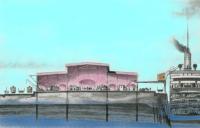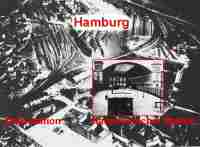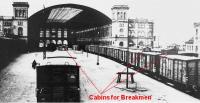Here is the moving story of Martha W., a Sinti woman. She was born in
1921 in
Kiel (Germany). On
20 May 1940 she
was deported to a
Belzec forced labour camp together with her two children (1
and 2 years old), her mother and her brother.
Comments and additions by ARC, in green.
 |
| Dock Shed |
 |
| Hannoverscher Station #1 * |
In May, I think it was
16 May 1940, they came for us and brought us to the
Fruchtschuppen (
warehouse for fruits) in the harbour
(
Hamburg).
My memory is not that good anymore. I only know that a lot of people were in the warehouse. It was like
being in an ant-hill, so many people were running around. We were registered and those above the age of
fourteen received a number on the arm. This was not tattooed, as was later the case in
Auschwitz, but
stamped in ink. This number faded after a few days. I cannot remember how many days we were in the
warehouse. Not many, perhaps three days. Quite nearby, only some steps away, we were ordered to enter goods wagons
(
at the Hannoverscher Station).
There was an awful confusion, there being hundreds of people. We were told that we were being transported to
Poland, where we would receive a nice little house. And they told me that my father was already there.
But we were deceived. When we arrived at our destination SS surrounded the train. They were there at our
arrival and drove us out of the wagons.
 |
| Hannoverscher Station #2 * |
Policemen had accompanied us, two to a wagon (probably within the breakers' cabin at the rear of some wagons).
We naturally did not travel without a guard. They knew we would have otherwise simply left the train and escaped.
We would have done this had we had the chance. The policemen, who had escorted us, appeared thoroughly sheepish
when they saw the SS and heard the SS commandant, a small man, standing there with a whip in his hand, immediately
shouting: "If you don't obey the orders!" Oh dear, and the rest he said. He called us dogs and we were treated as such.
That was so awful. The policemen from
Hamburg stood there speechless. I presume
they hadn't known what we were to
experience in
Belzec. Then we had to walk to a large barn, that was more a very
large shed. There was only old straw
on the floor. We all had to enter this shed. SS guards were posted outside.
Today I no longer remember how long we were in that
Belzec camp. It was summer
when we arrived. I think we were there
for some weeks. It was awful there. One could not wash oneself; there were no toilets. We were all crammed together.
We were immediately set to work in a work column. We had to dig tank ditches. There were many Jews in
Belzec too.
They were housed in the same shed as us and also worked in the column. They usually only remained for some weeks,
then were transported from
Belzec to somewhere else.
The food was awful. A Roma was detailed to cook for us all. The SS shot crows and ravens and simply threw them into
the large pot. The man didn't want to cook the birds without first plucking the feathers. They beat him so badly that
the blood ran out the bottom of his trousers.
One day those of us with children had to line up because the children were to receive something special to eat. I had
two children. My daughter was two and my son one year old. Each was given a bowl containing milk with bread crumbled
into it. Or so it appeared. This was especially for the children. Well, one child after the other died over the
following days. There was such a lamenting, lamenting and crying. Shortly after having eaten the children were unable
to breathe anymore, they asphyxiated. My little boy died first. Someone woke me in the morning. I was woken because
the child had kicked and the person wanted to cover him again. So I awoke and went to pick him up. He was already
quite stiff. I was devastated with grief and didn't know what to do. My cousin, the sister of Mrs. B., lifted him and
a big clot of pus came out of his throat. All the children experienced this. My two year old daughter died in the
same way the next day. They had been poisoned.
One day we had to enter cattle wagons again, in
Belzec. There was just a bare floor.
There were no windows only air
slits high up. There were no toilet facilities. We all had to enter that train, not knowing what to expect. Nobody
told us anything. We were taken to
Krychow. We travelled through the night in
this cattle wagon. When we arrived at
the station, horse-drawn vehicles awaited us that took us to the camp. It was a former Polish prison, far away from
the station. We were guarded by men wearing a black uniform. They were
Volksdeutsche
(
people of German origin, living outside of Germany). These
Volksdeutsche and SS
were everywhere.
Immediately after arriving we had to prepare our accommodation. In addition, a kitchen was to be built. We had to carry
large stones for its construction. We carried these stones on a board placed on the shoulder. Only the women did this
work.
The men had other work. The stones were terribly heavy. Later on we had to work in the moor. We stood with our legs
in the morass. The mud contained vegetation that cut the legs. My legs are scared for life as a result of this. The
entire length of my legs are today covered in bright spots because the morass was practically waist high. My legs
became completely septic. We had to dig out the mud for the construction of tank ditches. Having never done such
work before, I did not know how to handle the shovel. Although my legs were ulcerated, I had to return to work again
and again. Then my legs became inflamed. My mother acquired a cushion cover from somewhere, I don't know from where;
anyway she tore it into strips and bandaged my legs.
My brother had to work there too. I don't know the circumstances but they shot him. We found out from someone in the
camp that my father had died in
Dachau in
1941. He was initially taken to
Sachsenhausen and from there to
Mauthausen.
There he had to work in the quarry. My father was already 58 years old. That was killing work. From
Mauthausen he was
taken to
Dachau. I don't know exactly how he died there. In the camp we met
someone the same age as my mother. He
told us that my father had been imprisoned in a kind of bunker. He was not given anything to eat or drink because they
wanted to find out how long a human being could remain alive without sustenance. He told us that my father was no
longer recognizable. He was emaciated and shrivelled. Then he died.
My brother was dead and my two children, and now we knew that my father was also dead. My mother said to
me: "We must try to escape, it doesn't matter how, because otherwise we will not come out of here alive." That was
1942. One night we succeeded. We were in fear of our lives, but we succeeded. We got
out at night and ran and ran and
ran. We ran the entire night so as to get as far away as possible. We kept to the forests. We hid in hay stacks. We
made holes in the sides and crawled in. When we were far away from the camp, we met a Jew who had also escaped. He
had obviously seen our small fire that we had surreptitiously lit in the forest. He came to us, sat down and asked my
mother if he could join us. But my mother told him: "That's not possible. You had better travel alone and I too,
together with my daughter. If we stay together, they will surely catch us." She meant that the greater our number,
the more likely it was of being discovered.
Martha W. was on the run until 1945. She survived the Holocaust. She met her future
husband during her flight, with
whom she had a daughter and two sons after the war. The father of her first two children was deported to
Sachsenhausen in 1938 where he was murdered.
Photos
*:
Bildarchiv-Hamburg
Source: Karin Guth, Hamburg
Thanks to
Struan Robertson for translation
© ARC 2005









